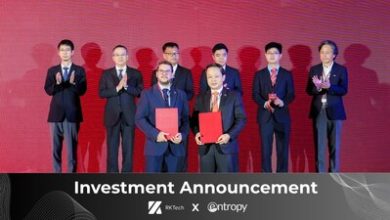ŌURA in Active Negotiations With RingConn to License Intellectual Property Owned by ŌURA
Exclusion and cease-and-desist orders protect the industry-defining form factor developed by ŌURA
SAN FRANCISCO–(BUSINESS WIRE)–The United States International Trade Commission (ITC) issued a final ruling in favor of ŌURA in the company’s patent infringement case against India-based Ultrahuman and China-based RingConn related to the Oura Ring form factor. The ITC found both companies in violation of Section 337 and ordered exclusion and cease-and-desist remedies banning the companies’ infringing smart rings and components from being imported into and sold in the U.S. market effective as of October 21, 2025.
The ITC’s comprehensive ruling reinforces the strength of the intellectual property portfolio held by ŌURA. The Commission upheld the administrative law judge’s (ALJ’s) findings that every asserted claim of the patent held by ŌURA is valid, enforceable, and infringed by Ultrahuman and RingConn. The decision confirmed that excluding the infringing products will not harm competition, consumers, or domestic manufacturing.
“We support a vibrant, competitive market, and litigation is always a last resort,” said Tom Hale, chief executive officer at ŌURA. “We prefer to compete on innovation and user experience, but when our core technology is copied, we have a responsibility to protect our team’s work and our users’ trust. We look forward to continuing to deliver on our vision to make health a daily practice for millions of Oura Members worldwide.”
ŌURA has demonstrated its willingness to collaborate with responsible players in the smart ring space through reasonable licensing agreements that create a win-win for both ŌURA and the licensees. The company successfully entered into a multi-year licensing deal with Circular last year and is in active negotiations with RingConn to establish a similar licensing agreement. These agreements are designed to appropriately compensate ŌURA for its pioneering innovations while offering a framework that enables the companies to continue to serve their customers.
”Our legal actions are about protecting fair competition, not eliminating it,” said Avonte Campinha-Bacote, chief legal officer at ŌURA. “Our ITC action was focused on protecting our intellectual property—innovations we’ve invested in for years. We want a level playing field where everyone competes fairly, and we’re open to entering agreements that reflect a shared respect for innovation and intellectual property, with companies that are capable of conducting themselves honorably.”
Both the ALJ in this case and the Commission highlighted serious concerns about the conduct of Ultrahuman, with the Commission stating, “Respondents’ willingness to blatantly misrepresent the proceedings…is emblematic of the lack of credibility Ultrahuman has shown regarding the domestic manufacturing issue throughout the investigation.” The Commission further noted, “Ultrahuman attempted to introduce at the hearing a ‘demonstrative’ [or visual aid] that altered video footage to make it appear that Ultrahuman itself operated a manufacturing facility in Texas. External signage was added, internal banners were replaced, and markings on parts were fabricated to make them appear as if they were Ultrahuman branded.”
U.S. Representatives Vern Buchanan (R-FL-16), Chair of the Ways and Means Health Subcommittee, and Troy Balderson (R-OH-12), a member of the Energy and Commerce Health Subcommittee and co-chair of the digital health caucus, shared a letter of support for the Administrative Law Judge’s initial determination: “Moreover, an increasingly urgent concern involves foreign-owned companies that infringe on U.S. patents while potentially exposing Americans to data privacy risks. These companies often operate under significantly weaker privacy standards, yet collect and store a large amount of sensitive health data. This not only threatens the integrity of our patent system but also poses serious economic and national security concerns as well as severe health impacts for impacted users.”
ŌURA is committed to protecting member data and complies with the most stringent global privacy laws including the GDPR and HIPAA. Privacy and data security are built into the company’s privacy-first business model, and the company’s privacy practices and policies have consistently been recognized by independent groups including Mozilla and UpGuard. Oura uses advanced technology and organizational safeguards to keep member data safe and secure and undergoes regular third-party audits to ensure the company is meeting the highest security standards for data protection.
The ITC final determination comes as India’s Delhi High Court dismissed a recent retaliatory patent infringement lawsuit filed by Ultrahuman. The court declared that Ultrahuman’s failure to include the U.S. ITC’s initial and final determinations, which were material to its complaint, was both willful and deliberate. Last week, ŌURA filed a suit in the Eastern District of Texas against Ultrahuman and SVTronics, Ultrahuman’s U.S. manufacturing partner, for infringing on five additional patents.
For access to the ITC final determination, visit here.
For access to the Delhi High Court’s dismissal, visit here.
For access to the suit against Ultrahuman and SVTronics, visit here.
About ŌURA:
ŌURA delivers personalized health data, insights, and daily guidance with Oura Ring, the leading smart ring that helps you live healthier, longer. Guided by a mission to shift healthcare from sick care to prevention, ŌURA supports millions of members worldwide across sleep, activity, stress, readiness, women’s health, and heart health. Scientifically validated against medical gold standards, the lightweight Oura Ring provides 50+ health and wellness metrics continuously, empowering both individuals and thousands of research teams, healthcare providers, and organizations. With 800+ ecosystem partners across wellness and medicine, ŌURA is advancing the future of preventative health.
Founded in Finland in 2013 and headquartered in San Francisco, ŌURA has raised $550M, most recently from Fidelity and Dexcom, and was last valued at $5.2B, making it the world’s most valuable standalone wearable company. Learn more at ouraring.com or connect with ŌURA on Instagram, LinkedIn, and TikTok.
Oura Ring is not a medical device and is not intended to diagnose, treat, cure, monitor, or prevent medical conditions or illnesses.
Contacts

